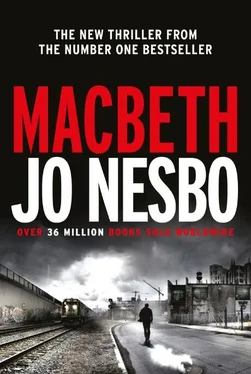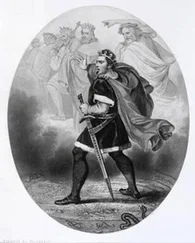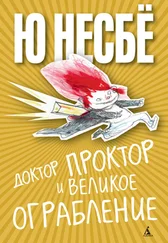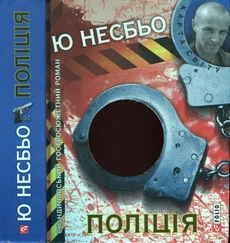The rest was drowned. Macbeth got up. From where he was standing in the gaming room he couldn’t see up to the station building, only the sloping square outside the tall window. But he could hear. It sounded like something was being crunched to pieces by a bellowing monster. And it was coming closer.
And then, crossing the square in front of the Inverness, it came into his field of vision.
He gulped.
Bertha was coming.
‘Fire!’
Deputy Chief Commissioner Malcolm stared in disbelief. Because he knew that whatever happened now he was never going to see the like of this again in his lifetime. A steam engine eating stone and making its own track across Workers’ Square. A form of transport their forefathers had built with iron, too heavy and solid to be held back, with ball bearings that didn’t rust or dry out after a mere eighty years of neglect, a locomotive against which a hail of bullets from a Gatling gun produced sparks but was repelled like water as it held its course straight towards Inverness Casino.
‘That is one solid building,’ someone said next to him.
Malcolm shook his head. ‘It’s just a gambling den,’ he said.
‘Hold on tight!’ Duff yelled.
Caithness had sat down on the iron floor with her back to the side of the cab to avoid ricochets from the bullets screaming over their heads. She shouted something, her facial muscles tensed and her eyes closed.
‘What?’ yelled Duff.
‘I love—’
Then they hit the Inverness.
Macbeth enjoyed the sight of Bertha filling the window before she smashed through. He had a feeling the whole building — the floor he was sitting on, the air in the room — everything was pushed back as the train broke through the wall into the room. The noise lay like a coating on his eardrums. The funnel on the steam engine cut through the eastern part of the mezzanine and its cow catcher dug into the floor. The Inverness had braked her, but Bertha was still eating her way forward, metre by metre. She stopped half a metre in front of him, with the funnel against the railing of the west mezzanine and the cow catcher touching the roulette table. For a moment there was total silence. Then came a rattle of crystal. And Macbeth knew what that was. Bertha had sliced the ropes holding the chandelier above him. He made no attempt to move, he didn’t even look up. All he noticed before everything went black was that he was covered in Bohemian glass.
Duff climbed up onto the train with the machine gun in his hands. The low rays of sun shone through the dust filling the air.
‘The Gatling gun in the south-east corner is unmanned!’ Caithness shouted behind him. ‘What about—’
‘Unmanned on the south-west too,’ Duff said. ‘Seyton’s lying by the roulette table with a dagger in him. Looks pretty dead.’
‘Kasi’s here. Looks like he’s unharmed.’
Duff scanned what once had been a gaming room. Coughed because of the dust. Listened. Apart from the frenetic rolling of a roulette ball in the wheel, there was silence. Sunday morning. In a few hours the church bells would peal. He clambered down. Stepped over Seyton’s body to the chandelier. Used the sabre to sweep away the bits of glass from Macbeth’s face.
Macbeth’s eyes were wide open with surprise, like a child’s. The point of the chandelier’s gilt spire had disappeared into his right shoulder. Not much blood ran from the wound, which contracted rhythmically as if sucking from the light fitting.
‘Good morning, Duff.’
‘Good morning, Macbeth.’
‘Heh heh. Do you remember we used to say that every morning when we got up in the orphanage, Duff? You were in the top bunk.’
‘Where are the others? Where’s Olafson?’
‘Clever lad, that Olafson. He knows when the time’s right to scarper. Like you.’
‘Your SWAT men don’t scarper,’ Duff said.
Macbeth sighed. ‘No, you’re right. Would you believe me if I said he’s behind you and will kill you in... erm, two seconds?’
Duff eyed Macbeth for a moment. Then he whirled round. Up where the mezzanine was cut in two, he saw two figures against the morning sun shining in through the hole in the east wall. One was a medieval suit of armour. The second, Olafson, kneeling with his rifle resting on the balustrade. Fifteen metres. Olafson could hit a penny from there.
A shot rang out.
Duff knew he was dead.
So why was he still standing?
The echo of the shot resounded through the room.
Macbeth saw Olafson fall against the suit of armour, which toppled back, fell through the gap in the mezzanine and clattered to the gaming-room floor. On the mezzanine Olafson lay with his face pressed to the railing. His cheek was pushed over one eye, the other was closed, as though he had fallen asleep over his Remington 700 rifle.
‘Fleance!’ Caithness shouted.
Duff turned to the northern end of the mezzanine.
And there, up where the stairs came down from the upper floors, stood Fleance. His shirt was drenched with blood, he was swaying and clinging to a still-smoking gun.
‘Caithness, get Kasi and Fleance out,’ Duff said. ‘Now.’
Duff slumped into the chair beside the roulette table. The ball in the wheel was slowing; the sound had changed.
‘What happens now?’ Macbeth groaned.
‘We wait here until the others come. They’ll patch you up at the hospital. Custody. Federal case. They’ll be talking about you for years, Macbeth.’
‘Still think you’ve got the top bunk, do you, Duff?’
Crystal rattled. Duff looked up. Macbeth had raised his left hand.
‘You know I have the speed of a fly. Before you’ve let go of that sabre and reached for your gun you’ll have a dagger in your chest. You know that, don’t you?’
‘Possibly,’ Duff said. Instead of feeling fear he felt just an immense weariness creeping over him. ‘And you’ll still lose, as always.’
Macbeth laughed. ‘And why’s that?’
‘It’s just one of those self-fulfilling things. You’ve always known, all your life, you’re doomed to lose in the end. That certainty is and always has been you, Macbeth.’
‘Oh yes? Haven’t you heard? No man born of woman can kill me. That’s Hecate’s promise, and he’s shown several times that he keeps his promises. So do you know what? I can just get up from here and go.’ He tried to lever himself up into a sitting position, but the weight of the chandelier pressed down on him.
‘Hecate forgot to take me into account when he made you that promise,’ Duff said, keeping an eye on Macbeth’s left hand. ‘I can kill you, so just lie still.’
‘Are you hard of hearing, Duff? I said—’
‘But I wasn’t born of woman,’ Duff wheezed.
‘You weren’t?’
‘No. I was cut out of my mother, not born.’ Duff leaned forward and ran his forefinger down the scar over his face.
Macbeth was blinking with his child-eyes. ‘You... you weren’t born when Sweno killed her?’
‘She was pregnant with me. I was told she was trying to stop the bleeding at the house of an officer when Sweno swung this—’ Duff raised the sabre ‘—and cut open her stomach.’
‘And your face.’
Duff nodded slowly. ‘You won’t get away from me, Macbeth. You’ve lost.’
‘Loss after loss. We start off having everything and then we lose everything. I thought it was the only thing that was certain, the amnesty of death. But not even that is guaranteed. Only you can give me death and send me to where I can be reunited with my beloved, Duff. Be my saviour.’
‘No. You’re under arrest and will rot alone in a prison.’
Macbeth chuckled. ‘I can’t, and you can’t stop yourself. You couldn’t stop yourself trying to kill me in the alley and you can’t now. We are as we are, Duff. Free will is an illusion. So do what you have to do. Do what you are . Or shall I help you and say their names? Meredith, Emily and—’
Читать дальше












